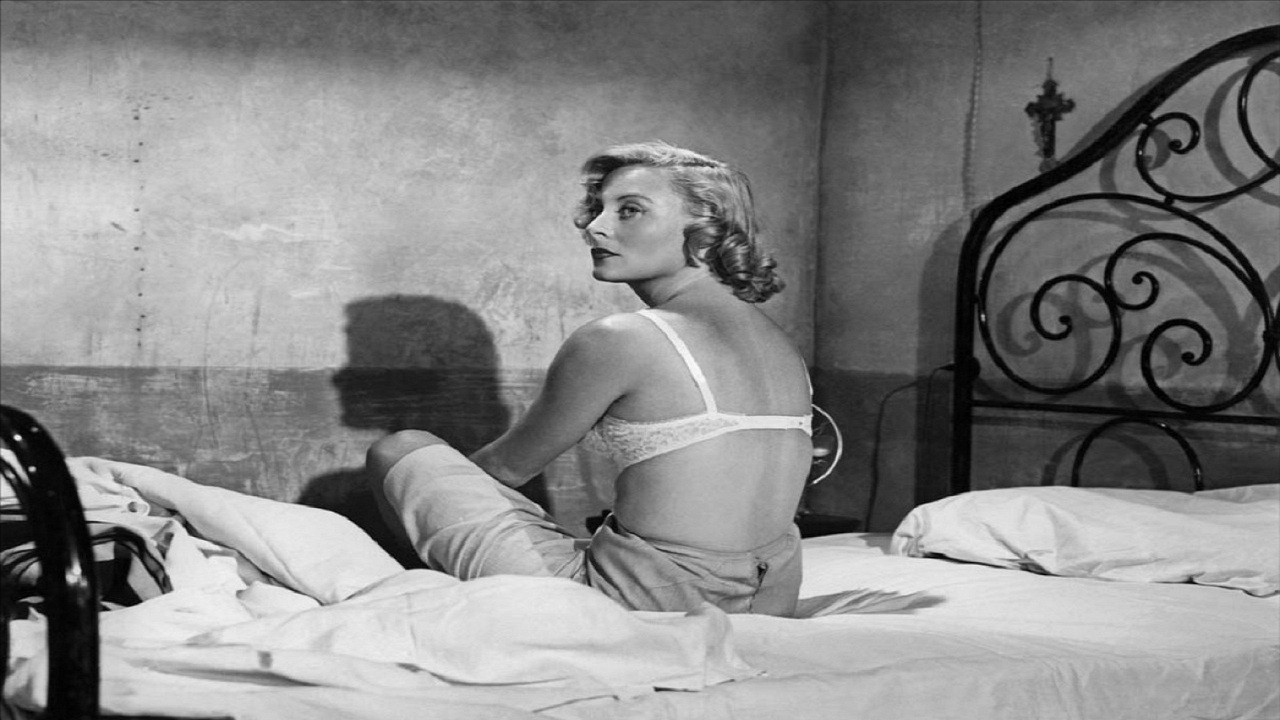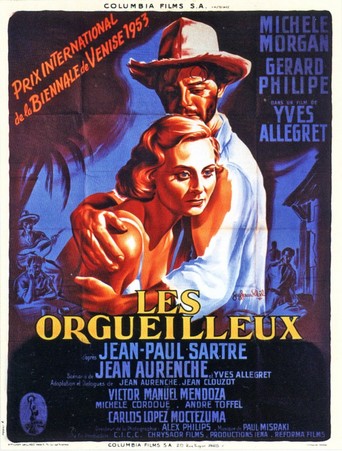

A brilliant film that helped define a genre
... View MoreA film of deceptively outspoken contemporary relevance, this is cinema at its most alert, alarming and alive.
... View MoreThe movie really just wants to entertain people.
... View MoreOne of the film's great tricks is that, for a time, you think it will go down a rabbit hole of unrealistic glorification.
... View MoreStory of a land more than story of characters. Admirable performance of Michelle Morgan. And sure, Gerard Philipe. You feel the heat and the poverty and the air. And, sure, the traits of love. A film like the picture of a world. And a love story as root of hope.
... View More'Les Orgueilleux' serves as my introduction to the movies of Yves Allegret. After viewing this, I definitely feel inclined to track down and watch more of his cinematic achievements.This is a startling and memorable movie to behold. Filmed in Mexico, it exhibits a level of hard-nosed realism that is striking. For me, the most outstanding aspect of this movie is the admirable creation of a strong atmosphere. Shifting from the Malaya that Sartre had originally envisioned to the remote Mexican Gulf Coast town of Alvarado, our troubled protagonists constantly drip in perspiration amid the torrid, stultifying turmoil of oppressive heat and a typhus epidemic. The cinematography of Alex Phillips vividly and imaginatively brings to life the heady and intoxicating atmosphere created. There is a wonderful framing of compositions with much happening invariably in the background. The camera that stops and observes while keeping track of proceedings wonderfully conveys the straining desperation and the edginess that pervades the town. The depiction of Easter celebrations adds to the swirling, unrelenting miasma. The sudden and intrusive clang of bells, the constant crackle of fireworks, and the wild beat of the huapango music contrives to put everybody on edge.The focus of Sartre's embryonic 1944 screenplay 'Typhus' is generally well reflected in this big screen treatment although the hopeful ending eventually led the pessimistic Sartre to distance himself from the finished film. Allegret and his team certainly give us rich and diverse characterisation of roles. Telerama hailed this as Michèle Morgan's best role of the 1950s, and they aren't far off, in my opinion. Halliwell's Film Guide roundly derides this movie as 'silly, poorly acted and unconvincing', which I think is a decidedly unfair judgement. Perhaps, they should re-evaluate it because I think Morgan absolutely shines as Nellie. She is warm, distantly sensuous and yet imposing as she surveys the surroundings in which she has been landed. The sense of numbness and isolation that she summons is perhaps particularly of note. The scene where she is alone with her dead husband exhibits great understanding of human emotion. Seemingly composed, she bends down to pick something up. Suddenly overcome by all that has happened, she starts heaving in tears in the darkened seclusion by the bedside. On a purely human level, Nellie's welling-up of emotions is realised in a very believable and gentle fashion by an actress of class and glacial beauty.Gerard Philipe utterly immerses himself in the frenetic blinding stupor of a disgraced man attempting to shut out his past. As Georges, he literally careens through the movie as a bearded drunkard on an unending bender. Philipe and Morgan are simply mesmerising and the absolute contrast in their characters proves compelling. They make the audience empathise with and feel for these trapped individuals every step of the way.This is a noteworthy movie featuring involving and interesting mood and characterisation. Allegret concocts a seething atmosphere inhabited by dislocated souls and succeeds in making the viewer care for them. An existential movie with a real edge, 'Les Orgueilleux' is an impressive accomplishment which offers a perceptive and uncompromising take on human nature.
... View MoreI would like to underline here the symbolical place and representative function of this good compact movie. This is how a clear-cut good movie looks. It is a melodramaand no crap, no ballast, no rubbish. Above all, intelligent, good moviethe obvious touch of a master. In other words, this is what has been lost. This ability, this craftsmanshipvery undervalued and despised and underrated. Far from being a masterpiece, this romance is a good moviewhat I found particularly satisfying, fulfilling, is the absence of the slapdash, of the mess ;fortunately, in its own time Les Orgueilleux did not pass unnoticed. Leprohon saw its merits.It is a good and important movieand also a representative of a schoolit was called the French School. Those who despised this style of movie-making, of fine movie-making, often had nothing to bring instead. A director like Yves Allégret addressed his films to an intelligent cultivated audience.Before we go on with the explanation of this very fine and achieved melodrama's importance, let us try to see what is the constitutive structure of a melodrama. Of a serious and intelligent one, that is. Of a melodrama that does set itself up for something. The first thing we see, dear reader, is the synthetic and somewhat symbolic (the word is not wholly adequate, and it must be taken under caution) language and content of a melodrama. In this film that we are discussing now one can immediately detect this adequacy of the meansthe narrative units, the characters, the psychologies, the mutual relations, the ways, the transitions, are to be taken as merely symbolic (that is, having an immediate aesthetic interest in themselves, and concomitantly standing for a larger meaning that is given in their concrete structure) and synthetic. On the other hand, notice how decently is this made, and how the Mexican characters speaking Spanish are not made to do this by speaking French with a Spanish accent. It might be, this phonetic accuracy, only a modest indicationthough, it says much about this movie, and this old French School director, having the right approach and the right understanding and the right respect for the audience.I believe the symbolical, the reflective ,the synthetic and the generic are the only chance of this sort of literature (or cinema)the non-autobiographical one.All such literature or cinema must choose a synthetic, generic and non-realistic expositionthe choice of the realism for the depicting of the supreme things, such as love and passion, fits only an autobiographic content. In other words, one cannot invent a realistic content for such a fictionhe either speaks strictly about what he has seen and met and lived, or he uses a symbolic, synthetic, compact and non-realistic approachas is the case with this film. It cures the mind of the stupidity with which today's melodramas imbue the mind of their viewers. This curative function is also important.Les Orgueilleux means several things, on many levelsit means what its author intended it to mean;--but it also means the French School in the '50s, right before the scene was taken over almost completely by puck-fists and crumbs who knew only to pot out, 'potchky around and mess uppothooks. And it means the level of excellence in simply making a good movie that was reached by these French School old honest directors. Their detractors reproached them they did not make masterpieces (but they often did !), and suggested that once the French School dismissed, a New Wave will come that will constantly produce only masterpieces.Les Orgueilleux is good, simple, clear and dramatic. It is psychological, thrilling and melodramatic. It means much as the witness of an epoch of normality and competence. This narrative and aesthetic competence is something fine and deeply satisfying. The story is simple and averagebut it is perfectly mastered and managed, very finely developed, very carefully thought. The several characters are well managed. Philippe makes one of his first-hand roles (I do not know very well his career; anyway, here is his best role that I know, and notable also for being an achieved drunkard role, an usually picturesque specialty that Philippe treats in a different and very competent way.) Like all the very great actors, Philippe makes the viewers think he was the only, and anyway the best choice for the role. So someone might ask: if I praise the movie like this, why don't I declare it a masterpiece? Because it is notand, more important, it doesn't pretend it is. It is, deliberately and with supreme mastery and equilibrium, a fine melodrama. If it proves something, it's that a fine melodrama can be rich, impressive and compactthis is its achievement, from a historical point of view.The French School directors were clear-sighted, clear-minded ,not at all muddled, maybe somewhat limited but certainly with a compact knowledge of the technical possibilities of their art; moreover, they did not have the cult of the geniality or, better, the superstition . Those who replaced the old directors brought sprawl. Someone wrote, very true, that today's melodramas are "patronisingly simplistic, sentimental and tiresome".Indeed.Well,Les Orgueilleux proves there was a time when they didn't have to be so.If you wish, make this test: ask yourself how many recent melodramas seem, next to Les Orgueilleux, anything but crap. I think I could offer several titles of American melodramas from the '50s that are almost as good as Les Orgueilleux, and you may compare the recent melodramas with these '50s American flicks, and the recent ones are still crapand crap out of crap.
... View MoreAllegret's most impressive location story, far better than the damp philosophizing of Une si jolie petite plage. I liked the approach: the characters are not symbols of alienation or corruption but have lives of their own. The meningitis outbreak in this Mexican town doesn't stand in for the moral decline of the West, unlike the plague in Puenzo's La peste, one of the worst films William Hurt ever made. I imagine that if Luis Bunuel had done this adaptation of a Sartre story, it would have looked a lot like Los olvidados, and the vomiting and sweating of the victims would have taken precedence over the moral self-questioning of the characters.Gerard Philipe is tremendous as the drunken ex-doctor with a terrible secret; he was able to forget that he'd become the official leading man of French cinema, star of the Cinema of Quality that Truffaut detested so much. Ditto for Michele Morgan, whose parts usually had aristocratic backgrounds, or at least great wealth. As the not-very-grieving widow of the first disease victim, she holds the picture together, making sure we don't get too swayed by Philipe's lowlife antics.
... View More